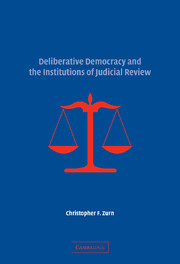Book contents
- Frontmatter
- Contents
- Acknowledgments
- 1 Introduction
- 2 Majoritarian Democracy and Minoritarian Constitutionalism
- 3 From Majoritarian to Deliberative Theories of Constitutional Democracy
- 4 Deliberative Democracy and Substantive Constitutionalism
- 5 Disagreement and the Constitution of Democracy
- 6 The Seducements of Juristic Discourse as Democratic Deliberation
- 7 Constitutionalism as the Procedural Structuring of Deliberative Democracy
- 8 The Institutions of Constitutional Review I: Design Problems and Judicial Review
- 9 The Institutions of Constitutional Review II: Horizontal Dispersal and Vertical Empowerment
- Bibliography
- Index
- Table of Cases
6 - The Seducements of Juristic Discourse as Democratic Deliberation
Published online by Cambridge University Press: 18 July 2009
- Frontmatter
- Contents
- Acknowledgments
- 1 Introduction
- 2 Majoritarian Democracy and Minoritarian Constitutionalism
- 3 From Majoritarian to Deliberative Theories of Constitutional Democracy
- 4 Deliberative Democracy and Substantive Constitutionalism
- 5 Disagreement and the Constitution of Democracy
- 6 The Seducements of Juristic Discourse as Democratic Deliberation
- 7 Constitutionalism as the Procedural Structuring of Deliberative Democracy
- 8 The Institutions of Constitutional Review I: Design Problems and Judicial Review
- 9 The Institutions of Constitutional Review II: Horizontal Dispersal and Vertical Empowerment
- Bibliography
- Index
- Table of Cases
Summary
The basic question at the heart of this chapter is whether we find in judicial opinions a language well-suited for principled moral and political argument in a democracy. At the most simple level, this chapter answers in the negative, based on the contention that juristic discourse is well tailored to arguments concerning legal rules, but not those concerning the principles, ideals, and values that underwrite and justify the laws we give to ourselves as democratic citizens. If this is right, then one prominent form of argument advanced by some deliberative theories of democracy justifying strong practices of judicial review in constitutional democracies should be abandoned. Recall that central to the antipaternalist attack on judicial review, whether as formulated by Hand, Dahl, Ely, or Waldron, is the notion that, because their members are electorally accountable, legislatures are representative institutions, whereas constitutional courts are not representative because their members are not electorally accountable. Perhaps, however, as deliberative democracy seeks to deemphasize voting as the paradigmatic democratic action, while celebrating deliberative reasons-responsive cooperation as the ideal of democratic citizenship, electoral accountability should no longer be thought central to the degree of representativeness of a political institution. On this idea, at least, the representativeness of an institution should be gauged in terms of its responsiveness to reasons, and in particular to certain kinds of reasons.
- Type
- Chapter
- Information
- Deliberative Democracy and the Institutions of Judicial Review , pp. 163 - 220Publisher: Cambridge University PressPrint publication year: 2007



